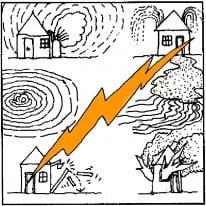C2 - Energy

Relates to safety and the following Healthy Living Practices:
- washing people
- washing clothes and bedding
- removing waste water safely
- improving nutrition: the ability to store, prepare and cook food
- reducing the effects of crowding
- controlling the temperature of the living environment
- reducing hazards that cause trauma
Energy is essential to many of the Healthy Living Practices and is required for most community activities.
Energy such as electricity, gas or solid fuel (wood or coal) may be expensive whereas renewable energy sources such as solar, wind, hydro or wood may provide a cheaper alternative if available and if there is the ability to invest in the capital equipment required to convert these energy sources into a useable form. Many communities have little choice or control over the supply and cost of various energy sources.
The energy needs of a community need to be considered as a whole in order to deliver affordable services to residents. This requires consideration of the energy options for different items of health hardware and the most efficient fuel source available. It may be more cost-effective to install solar hot water systems and energy efficient appliances in housing, or a reticulated gas system to the whole community, particularly if an electrical power generation system is subsidised by the state or territory government and the capital cost of the installation is equivalent to the subsidy.
The relative advantage of selecting electrical devices with reduced power consumption can be assessed by consulting: https://www.energyrating.gov.au/, which includes an energy rating for the following appliances:
- Electric stoves, ovens
- Refrigerators
- Freezers
- Ceiling fans
- Electric hot water services
- Boosted solar hot water services
- Heat pump hot water services
- Refrigerated air conditioners
- Reverse cycle air conditioners (in heating and cooling modes)
- Evaporative air conditioners
- Electric fan heaters
- Radiators
- Washing machines
- Fluorescent lamps
- Incandescent lamps
- LED lamps
- TV sets
- Water pumps
- Appliances such as toasters
This section includes a brief discussion about the systems that generate electricity for communities and about gas supply systems. For information about solar hot water heating, see B1.2 Hot water. Other types of energy systems are beyond the scope of this guide.
